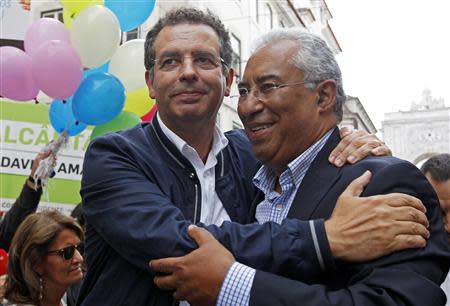Portugal's 'discredited' parties a boon for local independents

By Axel Bugge SINTRA, Portugal (Reuters) - Disillusion with Portugal's main parties, both battered by association with the country's deep economic crisis and international bailout, is translating into a surge in independent candidates for Sunday's local elections. While government austerity measures - a condition of the bailout - have sparked periodic protests and strikes, the protests haven't turned violent, as in Greece, nor have voters turned to extremist political parties to vent their anger. Their outlet, instead, appears to be the unaligned. The historic tourist town of Sintra, 30 kilometres (19 miles) west of Lisbon on the Atlantic coast, is an extreme example of the trend, with six independents among the 11 candidates for mayor, including a well-known singer in the local Fado tradition. "In the setting of the economic and financial crisis, of parties being discredited, there is a personalisation of politics, which helps independents and gives them a better chance," said political analyst Antonio Costa Pinto. Sunday's municipal vote will be Portugal's first local elections since the country started its austerity programme under a 78-billion-euro ($105 billion) bailout from the European Union and IMF in mid-2011. The bailout has led to massive spending cuts and tax hikes and tipped the country into a two-and-a-half year recession, with record unemployment levels. The electoral campaign is taking place in the middle of a review of the economy by EU and IMF officials, who are demanding more budget cuts. That isn't helping the center-left Socialists, who were in power when the country applied for the bailout in 2011, nor their successors, the center-right Social Democrats, who have implemented the austerity measures to secure the rescue funds. RECORD INDEPENDENTS At Sunday's vote, a record 80 independent candidates are standing for mayor in the country's 308 municipalities, up from 54 candidates at the last local elections in 2009. In several key municipalities, including Portugal's second city Porto, independents are in first or second place in the polls. Some observers think the local vote could be a watershed moment for Portuguese politics. "In the case of victory, independents will get a base to work from, be able to offer positions to their main supporters and be ready to carry out politics," wrote Ricardo Costa, director of weekly Expresso, in his blog. "It is still too early to draw conclusions, but it seems certain that the party system is about to go through one of its biggest changes in recent decades." While the traditional parties still stand to win most votes and return most mayors, they are likely to be down on their previous performance, especially the ruling Social Democrats. "We know that local elections carried out at this phase in the political cycle generally punish sitting governments," said Pedro Magalhaes, political scientist at the Social Sciences Institute of the Lisbon University. The Social Democrats have around 27 percent support in national polls, and their junior coalition partner, the rightist CDS-PP, have around 6.5 percent. The near collapse of the government in July when the CDS-PP threatened to quit over excessive austerity policies has not helped, boosting the Socialists, who have around 38 percent support nationally and lead the municipal race in Lisbon. In the center of Sintra, a former royal retreat and UNESCO World Heritage Site, the tourists have kept coming through the economic crisis, drawn to the beautiful landscape, the castles and the palaces, but it hasn't made the locals any fonder of politicians. "They are all the same," said Margarida Fereira, who works at the picturesque Pateo de Garrett cafe, when asked about the candidates. "It's been a long time since I voted." "Nothing will change with the election," said pensioner Francisco Monteiro, 66, who was discussing politics with friends. "I'm still thinking," he said, when asked if he had decided to vote. That cynicism is perhaps not helped by the fact that even among the ranks of independents, there are many refugees from the main national parties. "It is ironic that this is happening due to party divisions and not due to real independent movements," wrote Costa in his blog. ($1 = 0.7418 euros) (Reporting By Axel Bugge; Editing by Will Waterman)
